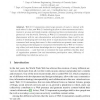Free Online Productivity Tools
i2Speak
i2Symbol
i2OCR
iTex2Img
iWeb2Print
iWeb2Shot
i2Type
iPdf2Split
iPdf2Merge
i2Bopomofo
i2Arabic
i2Style
i2Image
i2PDF
iLatex2Rtf
Sci2ools
103
click to vote
MDAI
2009
Springer
2009
Springer
A Consensus Reaching Model for Web 2.0 Communities
Web 2.0 Communities allow large amounts of users to interact with each others. In fact, new Web 2.0 technologies allow to share resources and information in an easy and timely manner, allowing real time communication among persons all over the world. However, as Web 2.0 Communities are a quite recent phenomenon with its own characteristics and particularities, there is still a necessity of developing new tools that allow to reach decisions with a high enough consensus level among their users. In this contribution we present a new consensus reaching model designed to incorporate the benefits that a Web 2.0 Community offers (rich and diverse knowledge due to a large number of users, real-time communication. . . ) and that tries to minimize the main problems that this kind of organization presents (low and intermittent participation rates, difficulty of establishing trust relations and so on).
Related Content
| Added | 27 May 2010 |
| Updated | 27 May 2010 |
| Type | Conference |
| Year | 2009 |
| Where | MDAI |
| Authors | Sergio Alonso, Ignacio J. Pérez, Francisco Javier Cabrerizo, Enrique Herrera-Viedma |
Comments (0)

